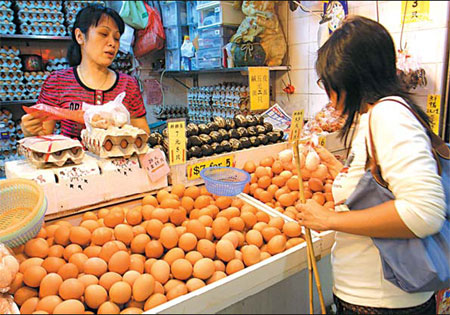The authorities may revise production standards for animal feed after excessive levels of melamine were found in eggs exported to Hong Kong, sources with the Ministry of Agriculture said.
The industrial chemical has been at the heart of the tainted-milk scandal that has made tens of thousands of Chinese children ill - but current rules set no limit for melamine content in animal feed.
Although testing for melamine is recommended, it is not compulsory, leaving loopholes in the production process, an official with the ministry was quoted by Xinmin.cn website as saying yesterday.
The Ministry of Health set new limits on melamine levels in dairy products after milk food contaminated with the chemical killed at least four infants and sickened more than 54,000, most with urinary tract problems.
A maximum of 2.5 mg/kg is allowed for liquid milk, milk powder and food products as experts said it is impossible to make the products completely free of the chemical because of packaging, which typically contains melamine.
|

|
|
A woman buys eggs in a Hong Kong market Sunday. Hong Kong authorities have expanded their health tests to meat products from the mainland after excessive levels of melamine were found in a batch of eggs supplied by a Dalian-based company. [China Daily] |
Hong Kong health officials announced on Saturday that 4.7 parts per million (ppm) of melamine was found in eggs supplied by a division of the Dalian Hanwei Enterprise Group in Liaoning province. The legal limit in food products in Hong Kong is 2.5 ppm.
Wang Yu, a Hanwei employee, was quoted by people.com.cn as saying yesterday he was shocked to learn about the contaminated eggs. He said it was not possible for the chemical to have been intentionally added to the feed, but said it may have come from raw materials for the feed.
Hanwei chairman Han Wei on Monday apologized for the incident in Hong Kong media.
"We solemnly apologize to consumers and distributors. We solemnly state that my company had never purchased melamine or added melamine to feed or products," Han said.
"No one asks for protein levels in eggs, so there is no need for us to add melamine to our eggs," he said.
"We bear an undeniable responsibility for it."
Han said his company discovered the chemical in chicken feed in September and immediately stopped using it.
The tainted egg brand, Jiazhixuan, is specially for export to Hong Kong.
In Guangzhou, supermarkets started taking Gegeda, another Hanwei brand, off the shelves on Monday, though no high melamine content has been found in them. Sales of Hanwei products have suffered greatly, even in Dalian, where the company is based, after the incident.
Wal-Mart said yesterday it had stopped selling eggs under Hanwei's brand in its Chinese stores. "We just want to make sure the products on our shelves are safe," Mu Mingming, a spokeswoman for Wal-Mart, said.
(China Daily/Agencies October 29, 2008)